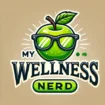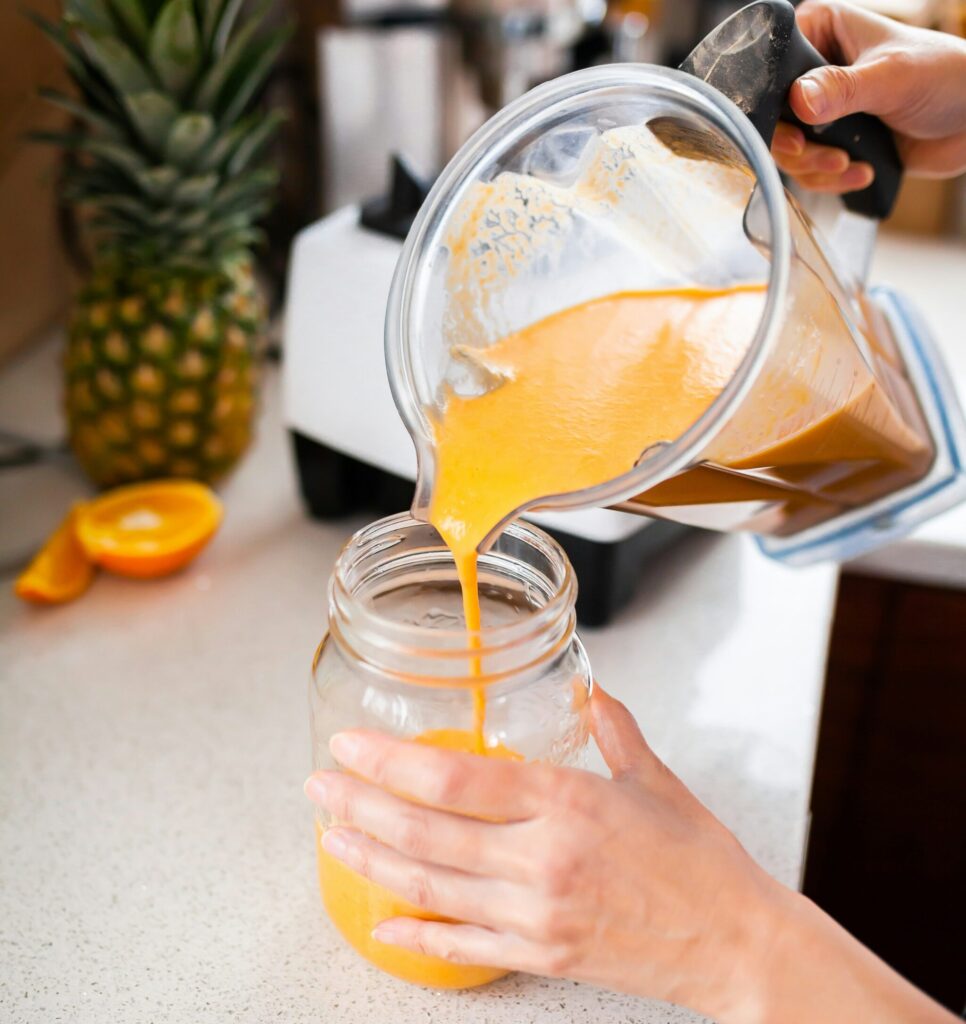Smoothies are already delicious, but sometimes your taste buds scream, “Make it sweeter!” In this article, we’ll break down the best sweeteners for smoothies—from natural options like honey and dates to zero-calorie heroes like stevia.
We’ll rate each one, discuss the pros and cons, and name our top pick based on health, taste, and smoothie compatibility.
So, whether you’re sipping a green detox blend or a creamy banana peanut butter concoction, the right sweetener can make or break your smoothie experience.
We are going to take a look at:
- Exploring the most popular sweeteners for smoothies (excluding fruit-based ones)
- Highlight the benefits, drawbacks, and insights of each
- Give each sweetener a rating out of 10
- Finish with a recommendation for the best sweetener for smoothies overall
Now, let’s sweeten things up!

The Best Sweeteners for Smoothies Rated
1. Raw Honey
Before sugar packets and trendy sugar substitutes, there was honey—golden, gooey, and straight from the hive.
Truly, it really is a beloved classic in the world of natural sweeteners and is often praised for its wholesomeness and gentle sweetness.
But is it all its buzzed up to be?
Raw Honey Rating: 8.5/10
Pros:
- All-natural and full of antioxidants and many other good things
- Contains trace amounts of vitamins and minerals boosting nutritional profile
- Adds a rich, floral flavor depth to make smoothies delicious
- Boosts energy levels quickly (contains a glucose + fructose combo)
Cons:
- High in sugar and calories (approx. 64 Cals/tbsp) – for those watching their diet
- Not suitable for vegans and diabetics
- Can spike blood sugar levels
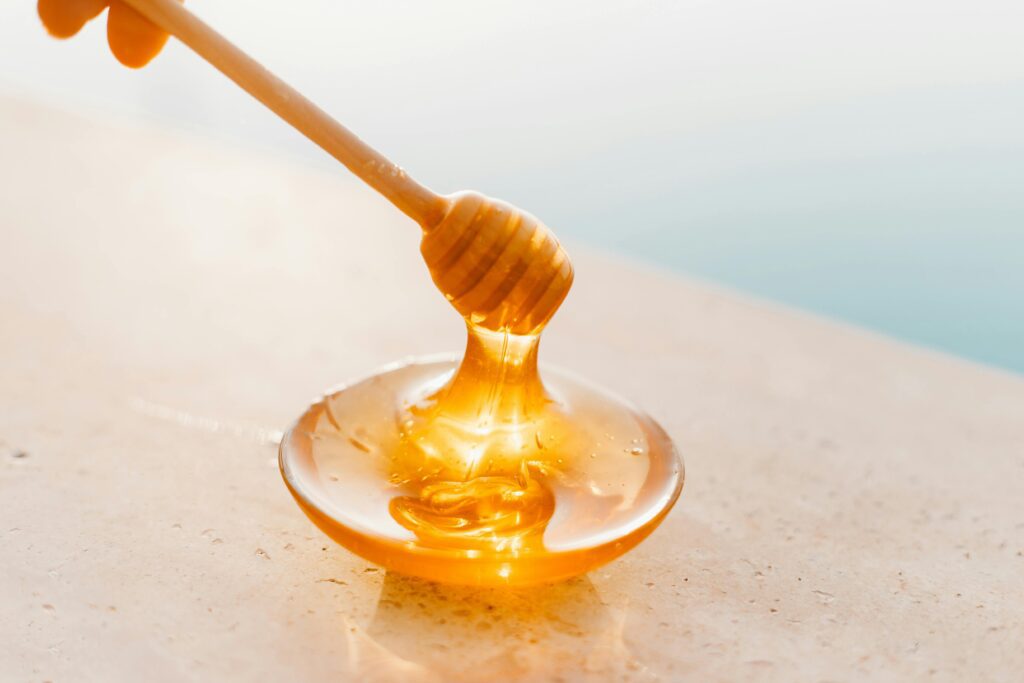
According to a 2018 study in Nutrients, raw honey has antimicrobial and antioxidant properties—but it’s still super sweet and sugary, so moderation is key.
However, just because it contains natural sugars, does that mean it should be demonized? Of course not!
Since refined sugar is known as bad for your health, that doesn’t mean we should attack raw honey as well. A lot of how the body responds to natural sugars like honey depends on the health of your body.
If you are active, exercise regularly, don’t have diabetes or insulin resistance, honey is an amazing sweetener to sweeten up anything including smoothies.
Rating Explained
I gave this an 8.5 out of 10 rating because raw honey truly is one of the best sweeteners out there. It’s super nutritious, easy to use, convenient, and perfect for smoothies.
However, it’s not perfect because not everyone can use it.
Those with diabetes and insulin resistance may not fully benefit.
On the other hand, for healthy persons of all ages, raw honey can do wonders for your health.
And especially for active individuals, honey can super charge energy levels fueling great workouts.
To be honest, my personal favorite for smoothies is raw honey.
2. Dates
If sweeteners had a “superfood” cousin, it would be the mighty date.
These wrinkly little fruits are packed with fiber and nutrients, and their sticky sweetness makes them a popular pick for blending into smoothies.
Let’s see how they stack up.
Dates Rating: 9/10
Pros:
- High in fiber which is great for digestion and steady energy release
- Rich in nutrients such as potassium, magnesium, and antioxidants
- Adds a rich wholesome caramel-like taste
- Low glycemic index – which means it releases the sugars more slowly
Cons:
- Blending whole dates can be a pain without a high-powered blender as they do not blend well in budget blenders
- Is calorie-dense (about 66 calories per Medjool date – approx. 24 grams in weight)
- Can, at times, overpower delicate smoothie flavors if used incorrectly
Overall, dates score better on the nutrient density scale than most other natural sweeteners. Plus, they have a low to moderate glycemic load when eaten whole.
Rating Explained
Dates score a 9 out of 10 because they really are very beneficial in so many ways. Also, they have the addition of fiber, something raw honey lacks.
Therefore, dates score higher than honey in the overall rating. It is one of the best sweeteners for smoothies.
Personally, I do prefer honey for smoothies, but that’s just my personal opinion.
However, dates make an incredibly rich tasty smoothie. It often leaves little pieces behind in the smoothie, making it more enjoyable. It’s like a date choc chip floating around a delicious health drink.
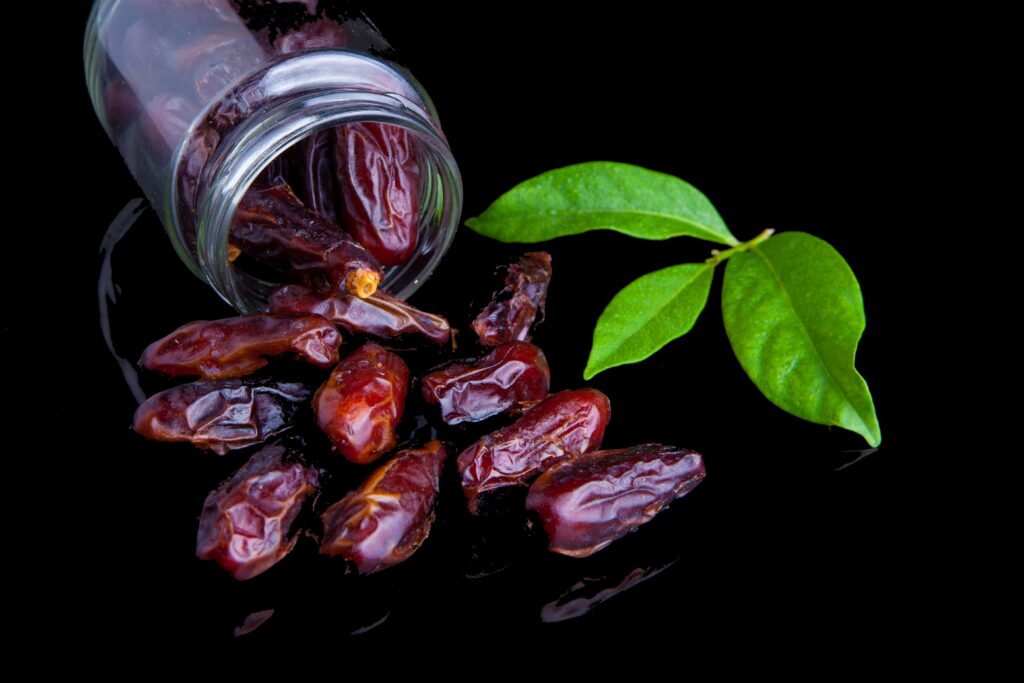
3. Maple Syrup
Let’s try tapping into tree sap for a sugar fix. Sounds wild, doesn’t it? But maple syrup has been doing just that for centuries.
Rich, smooth, and just a bit rustic, this pancake favorite might also have a place in your blender.
Maple Syrup Rating: 6/10
Pros:
- 100% natural from tree sap. As natural as can be
- Contains essential nutrients like zinc, manganese, and polyphenols
- Has a smooth taste that blends well with nut-based smoothies
Cons:
- High in natural sugars and calories which could negatively affect some (about 52 Cals/tbsp)
- Not ideal for blood sugar control
- Can get very pricey for the real stuff which may not be sustainable to add regularly into smoothies
In research found from the University of Rhode Island, there are over 24 antioxidants in pure maple syrup making it a healthier option in the liquid sweetener world.
Rating Explained
I give this natural sweetener a rating of 6 because it is not the ideal smoothie sweetener companion.
It can be very costly for the real deal, especially if you live outside of Canada due to import costs.
Thus, it is not sustainable for a regular smoothie plan unless you can afford it. Choose raw honey instead!
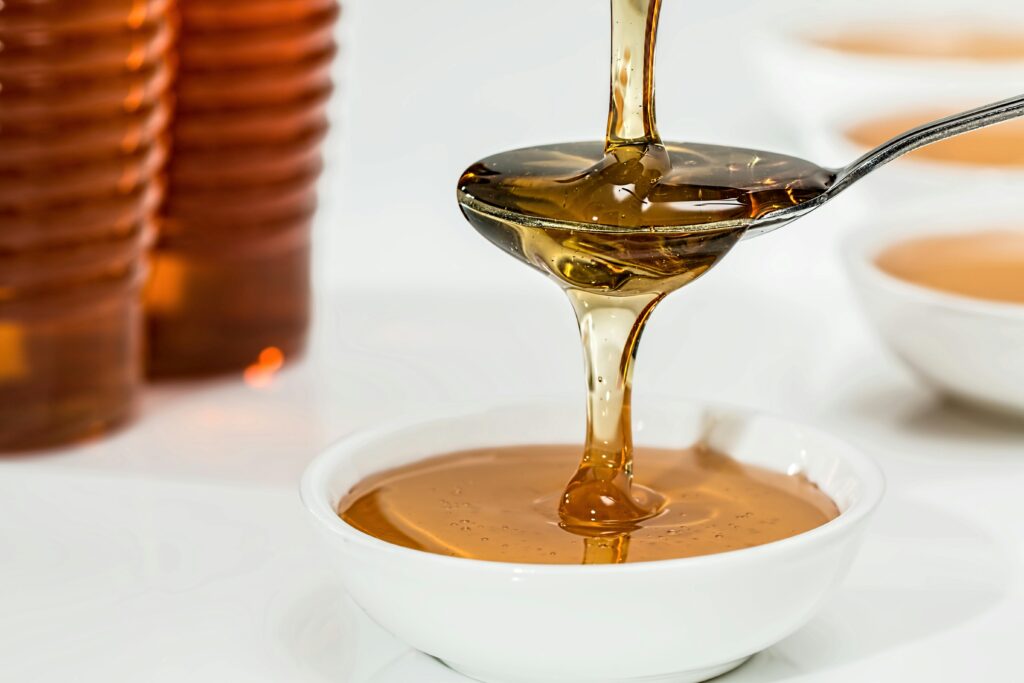
Some links on this blog are affiliate links. If you click and make a purchase, I may earn a small commission—at no extra cost to you.
4. Stevia
Stevia is the plant-based sweetener that’s become a household name in the zero-calorie world.
Derived from the leaves of the Stevia rebaudiana plant, it’s super SUPER sweet (seriously—you only need a sprinkle).
But is it smoothie-friendly?
Stevia Rating: 7/10
Pros:
- Zero calories, perfect for diets and lower calorie eating plans
- Doesn’t raise blood sugar or insulin levels which is great for diabetics
- A little goes a LONG way
Cons:
- Can sometimes taste bitter or licorice-y to some depending on the brand or stevia style chosen
- Overuse can ruin the flavor balance, so start very small and adjust from there
- Can leave a sweet after taste in your mouth which may not be pleasant for some
In a 2010 study in Appetite, it showed stevia doesn’t trigger insulin like sugar does, making it ideal for low-carb or keto smoothie lovers.
In addition, this is one of the best options for those with blood sugar problems like diabetes or insulin resistance.
And it’s fantastic for those on a weight loss or low sugar diet because it adds sweetness without calories allowing you to keep calories to a minimum.
For more on weight loss and smoothies read my other article called: Smoothies for Weight Loss – How to Sip Your Way Slim.
If you are looking for a great done-for-you smoothie diet program, click this link now to learn more!
Rating Explained
Despite stevia’s many cons such as: it being zero calorie, super sweet resulting in using smaller quantities, it does not out do honey and dates even though these are higher in calories.
Firstly, stevia comes in a powder and a liquid form, so you’ll need to see which one suits you best.
Secondly, stevia sometimes has a slightly bitter twist which can put some people off. And even if the bitterness is removed, others just can’t get past that lasting lingering sweetness left in the mouth.
So, while good for smoothies and for a lot of people, it’s not for everyone, therefore it’s rated lower than honey and dates in this rating.
But if you goal is weight loss (Click HERE for the rapid weight loss program), cutting calories, or blood sugar concerns, then stevia is your best option.

5. Agave Nectar
Agave nectar hit the scene with a health halo, thanks to its low glycemic index and smooth, neutral flavor.
But behind that golden glow lies a bit of controversy.
Is it truly a better-for-you alternative—or just fancy sugar in disguise?
Agave Nectar Rating: 4/10
Pros:
- It’s sweeter than sugar, so you can use less
- Dissolves easily in cold smoothies
- Has a low glycemic index
Cons:
- Very high in fructose (~85%) which can strain the liver in excess
- Is highly processed which isn’t ideal
- It’s not actually better than sugar for long-term health
In Harvard Health, it warns that agave’s fructose content may promote fat buildup around the liver. So, use it sparingly, if at all. Or rather just skip it all together.
Fun Fact: The same agave plant used to make agave nectar is also the key ingredient in tequila! In fact, tequila can only be made from the blue Weber agave—talk about a plant that knows how to party!
Rating Explained
Agave nectar is not actually a great smoothie companion to use regularly, it’s too high in fructose that has been refined.
If you choose to use it, I’d recommend using a little at a time just to add a bit of sweetness to some tea or coffee.
Therefore, due to all of agave’s complications I have rated it with a 4 out of 10. Sorry agave.
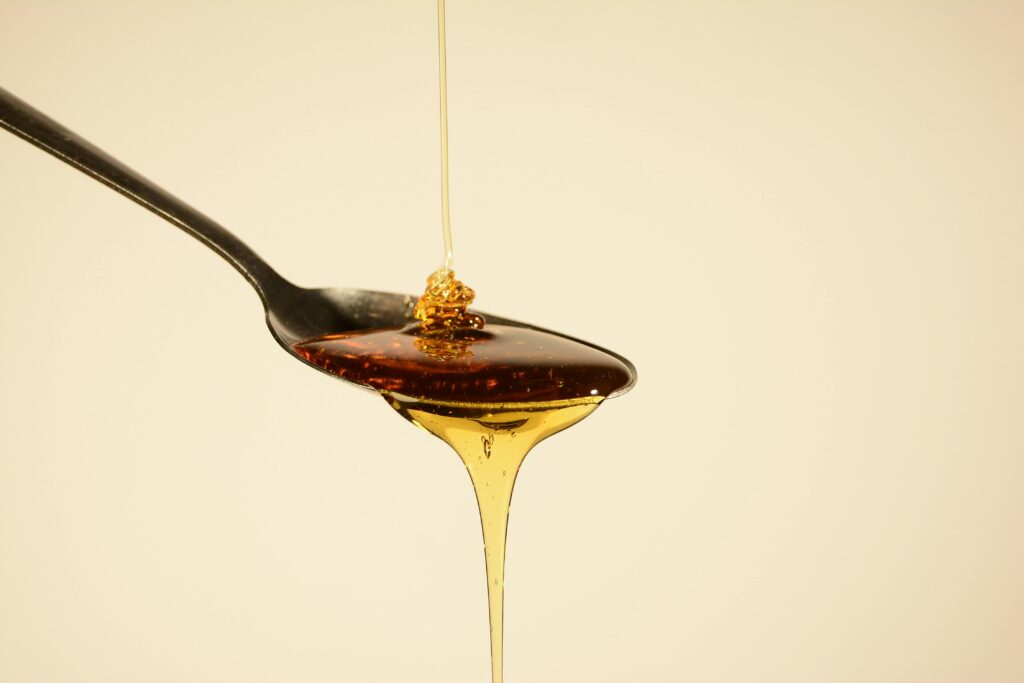
6. Coconut Sugar
Coconut sugar comes from the sap of coconut palms, not the fruit, and has gained popularity as a more “natural” alternative to refined sugar.
Earthy, mild, and slightly caramel-like—could this tropical option be your smoothie’s new best friend?
Coconut Sugar Rating: 5/10
Pros:
- Contains small amounts of iron, zinc and calcium
- Has a slightly lower glycemic index than white sugar
- It’s caramel-like flavor pairs nicely with chocolate or nut-based smoothies
Cons:
- Calorically similar to table sugar (15 calories per teaspoon of 4 grams)
- Still is a form of added sugar
- Contains minimal actual health benefit vs regular sugar, but is a bit better
Overall, coconut sugar retains some of the nutrients found in the coconut palm sap, but not enough to call it “healthy” in large amounts.
Rating Explained
Coconut sugar scores a 5 due to its lack in high nutrient availability, and it’s not actually that sweet. Therefore, it’s not one of the best sweeteners for smoothies.
I find I need to use quite a lot in order for it to sweeten something, thus it is not a sustainable option long term.
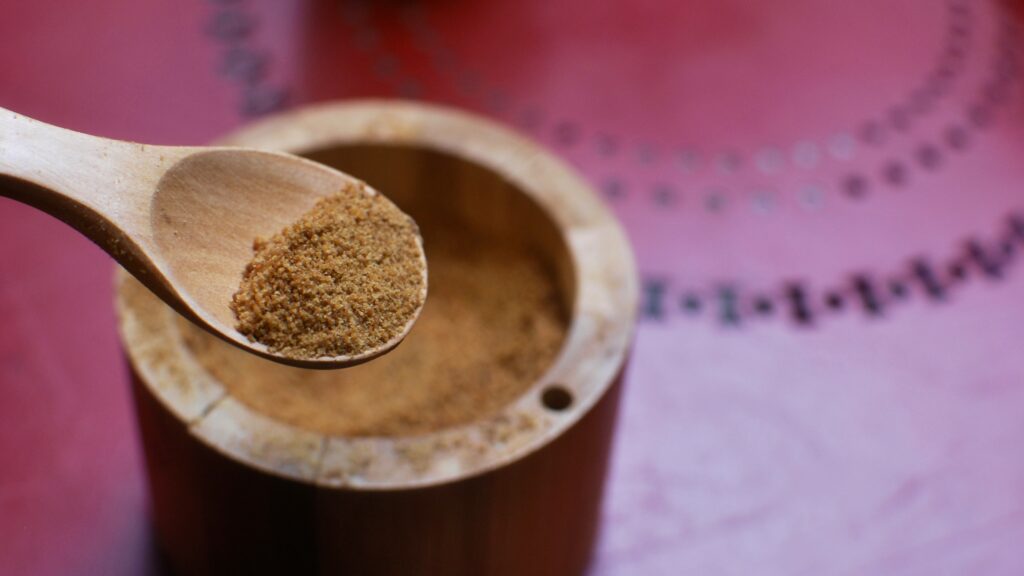
7. Monk Fruit Sweetener
Monk fruit, also known as Luo Han Guo, is a tiny melon that packs a sweet punch. Interestingly, it’s up to 200 times sweeter than table sugar.
It’s calorie-free, carb-free, and starting to show up in everything from coffee to baked goods. Sounds like a dream right!
But how does it do in a smoothie?
Monk Fruit Rating: 8/10
Pros:
- Zero calories – perfect for weight loss (weight loss smoothie program HERE)
- Doesn’t impact blood sugar – great for diabetics
- Sweeter than sugar – a little goes a long way (watch out stevia)
- Is often blended with erythritol, which smooths out and refines the taste
Cons:
- Is Expensive to use consistently
- May cause bloating in sensitive individuals (thanks mostly to erythritol being added)
- Not always easy to find in pure form. It’s found mainly in specialized health food/supplement stores, not a general grocery store
In addition, monk fruit contains mogrosides, which has antioxidant and anti-inflammatory properties.
Rating Explained
In high competition with stevia, as both have similar attributes, monk fruit gets a one up rating over stevia, 8 out of 10.
It eliminates the after-taste issues stevia is known for. However, introduces a few others.
Monk fruit may cost more, be less available, and could irritate the gut in some people, so it’s also not perfect.
Overall, this is one of the best sweeteners for smoothies. It’s great for those conscious about maintaining a leaner body composition or dieting, while at the same time enjoying sweetening up a smoothie, or anything else.
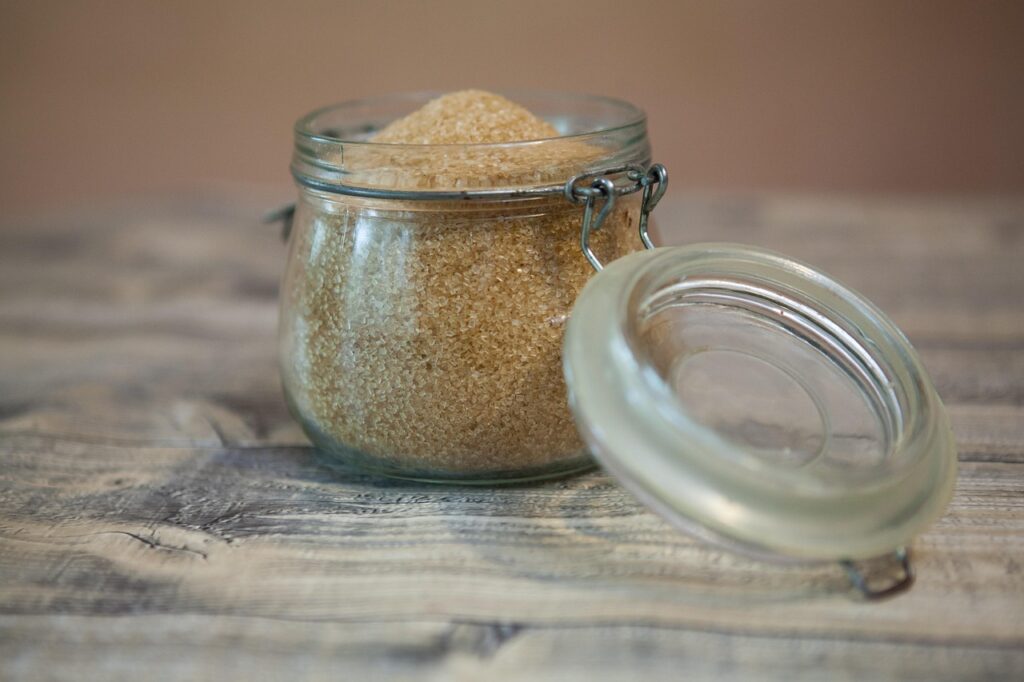
8. Erythritol
Erythritol might sound like a chemistry experiment, but it’s a popular sugar alcohol found in everything from protein bars to keto desserts.
It tastes like normal table sugar but doesn’t act like it in the body, which sounds perfect unless your stomach has other plans.
Erythritol Rating: 5/10
Pros:
- Very low in calories (0.24 cal/g)
- Doesn’t raise blood sugar levels
- Tastes very close to sugar
Cons:
- Can cause gas, bloating and stomach upset in some people
- Sometimes leaves a “cooling” sensation in the mouth and on the tongue
- Not so natural in large doses
Studies show that it passes through our body mostly undigested. It’s considered safe but should be used mindfully.
Rating Explained
In my opinion, erythritol does not belong in smoothies. It’s not natural enough. And it upsets too many people’s stomachs.
Therefore, despite its other strengths, leave it out of smoothies and rather use it in desserts and other items.
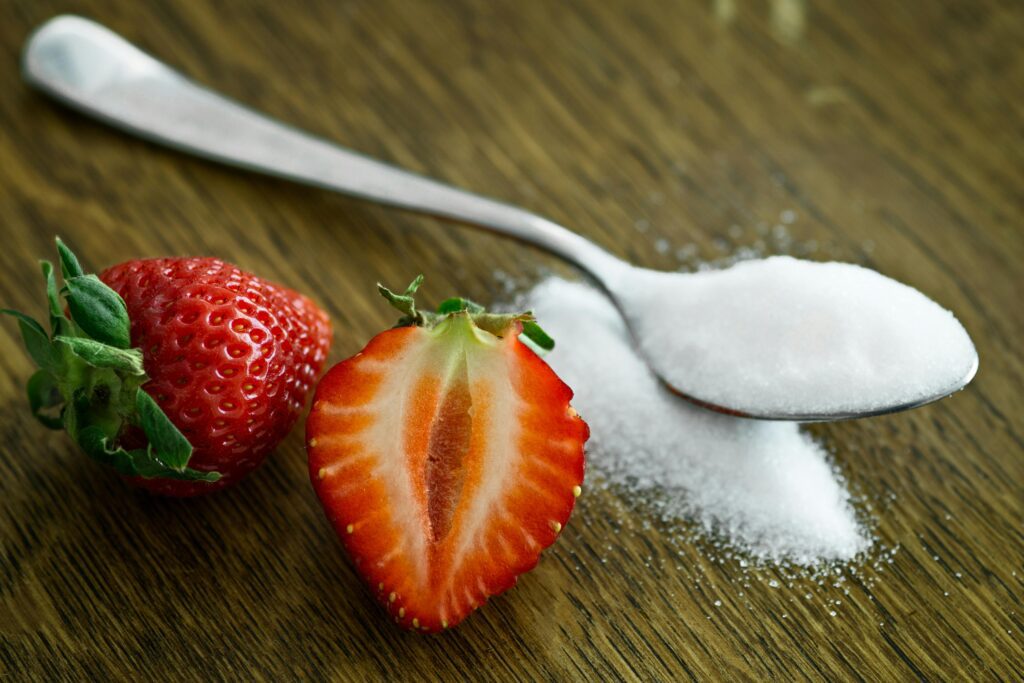
The Best Sweetener for Smoothies Verdict
After diving into some of the pros and cons of the most popular sweeteners on the market, who takes the crown in this showdown?
If we’re talking overall best sweeteners for smoothies, here’s the final verdict:
- Best Natural Option: Dates — they win for nutrition, fiber, and taste (when blended well and with the right blender)
- Best Low-Calorie Option: Monk Fruit — for those not watching their budgets, and for those watching their sugar or carb intake. Alternatively, Stevia could actually be rated best low-calorie option as well if we had to choose a more budget friendly option.
- Best All-Arounder: Raw honey — if you want something natural, easy, and delicious (and you’re not vegan). In fact, raw honey is my personal favorite for its ease of use, and there are so many flavor variants out there. And please note, I said RAW honey! Not just any store-bought honey.
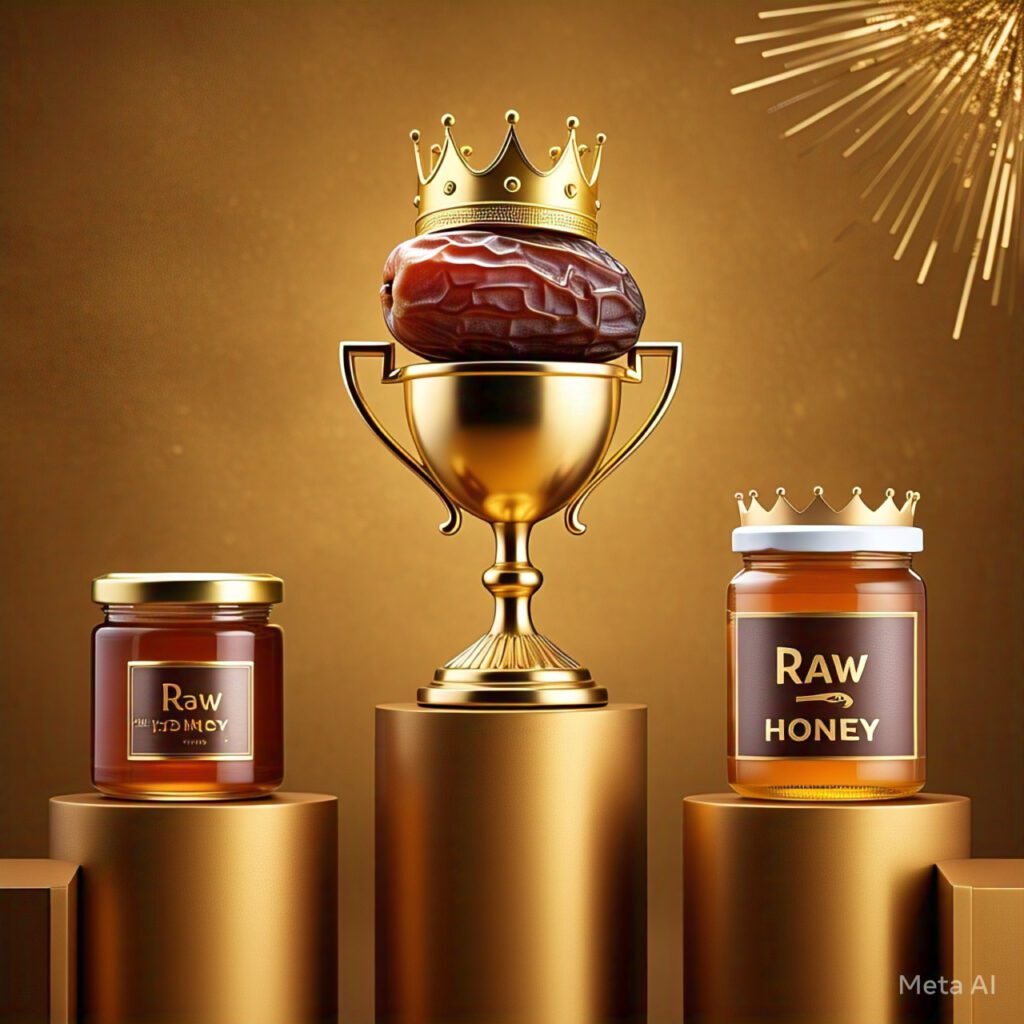
Final Thoughts on the Best Sweeteners for Smoothies
In this article, we’ve enjoyed exploring the best sweeteners for smoothies, going from honey to monk fruit to coconut sugar and beyond.
For some delicious smoothie recipes see this article here: 3 Fat Loss Smoothie Recipes to Keep You Full and Skinny!
Yes, each one has its own pros, cons, and “sweet spot” (pun totally intended).
So, when choosing the best sweeteners for smoothies, always consider the following:
- Your health goals (weight loss, blood sugar control, etc.)
- Your taste preferences
- Your financial budget, as some of these sweeteners can be costly if used daily
- Your blender strength (for whole foods like dates)
We hope this article has proved to be helpful when it comes to helping you choose the right way to sweeten your smoothies.
Cheers!
